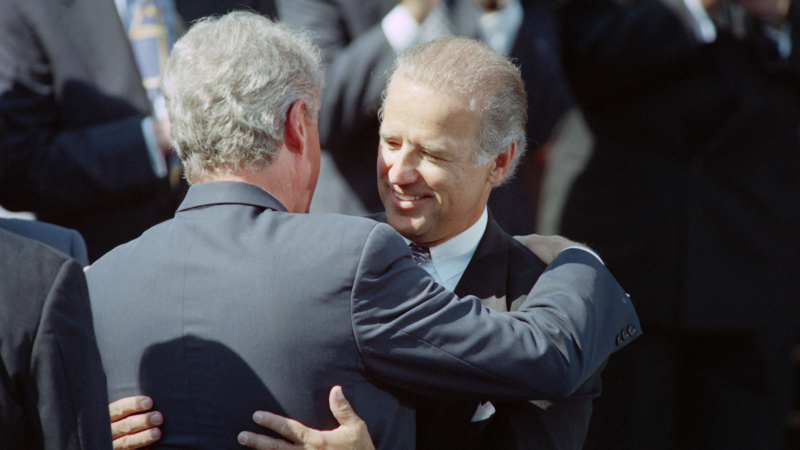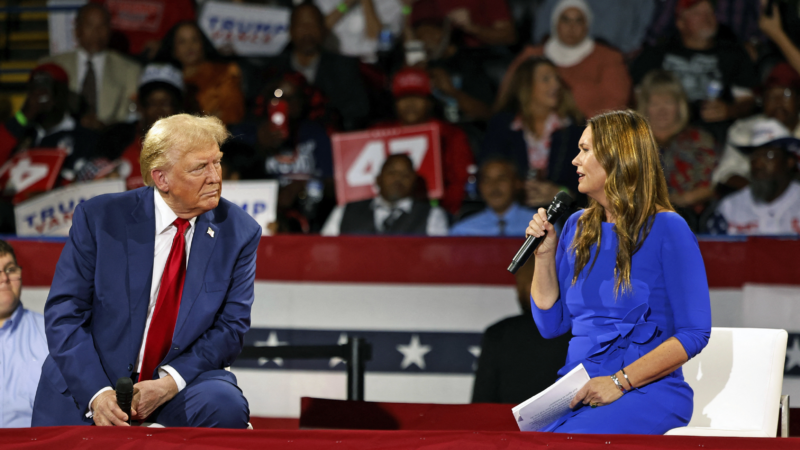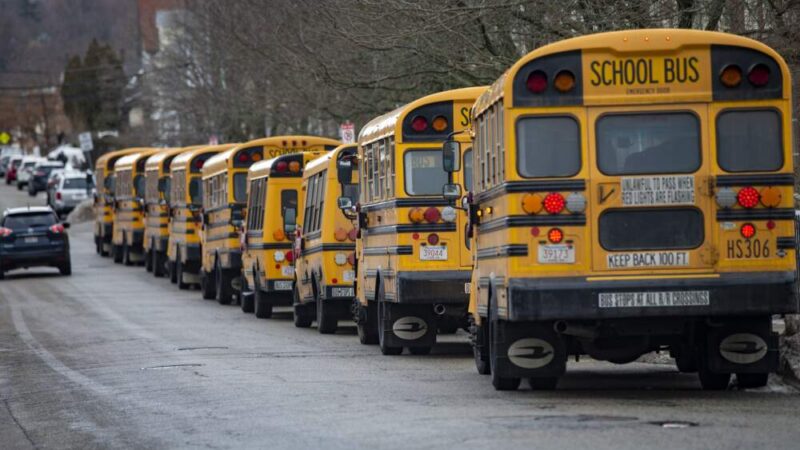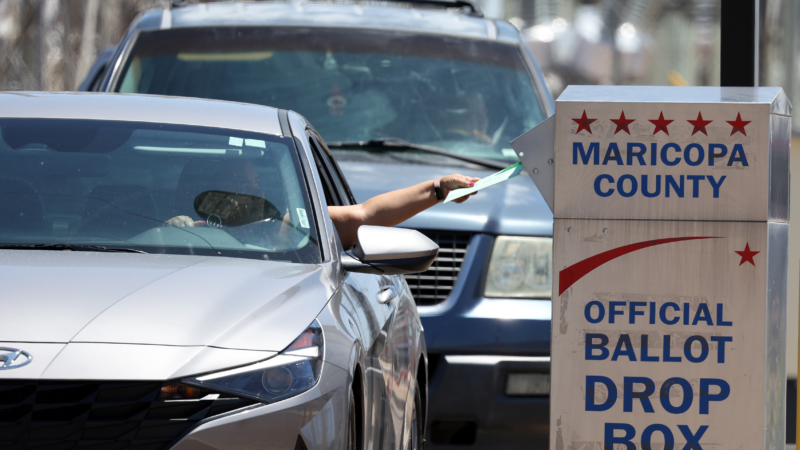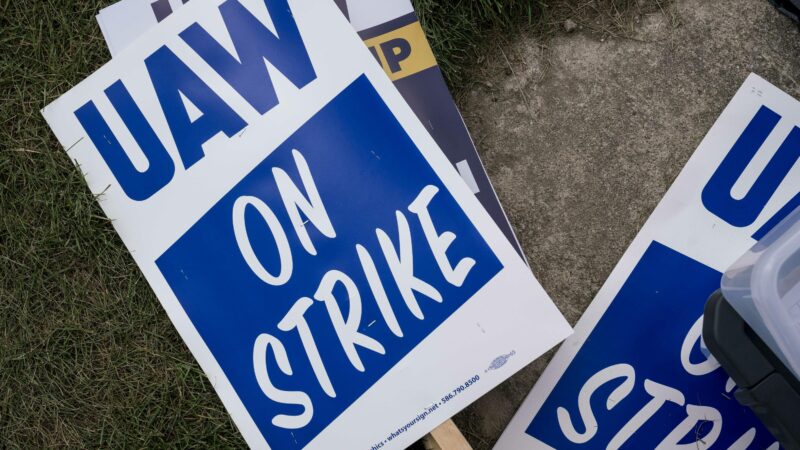From Clinton to Trump, how talk about crime has changed since a landmark bill
Thirty years ago this Friday, then-President Bill Clinton signed what amounted to the biggest federal intervention in crime and justice in a generation.
The 1994 Violent Crime Control and Law Enforcement Act paid to put more cops on the streets, imposed tougher sentences and provided federal funds to build more prisons.
In the years since, many of its architects have come to consider it a terrible mistake.
The conversation about public safety has changed a lot in the past few decades, said Nick Turner, who leads the Vera Institute of Justice.
“Crime is lower. Perceptions of crime are lower. People are more skeptical of tough-on-crime responses,” Turner said.
Violent crime still features in plenty of political attack ads this year. At this week’s presidential debate, former President Donald Trump highlighted offenses that he alleged had been committed by immigrants.
But the excesses of the justice system also got a mention, when Vice President Harris brought up the Central Park Five. Those young men were convicted, then later exonerated, for the brutal assault of a jogger in New York City back in 1989. They also took the stage during the Democratic National Convention this summer.
“The exonerated five were on stage acknowledging the depredations and the harms that can be caused, by a system that’s overly aggressive,” Turner said.
“Carrot and stick approach”
For all the talk about politicians being tough on crime or soft on crime, the federal government’s role in justice policy is limited. State and local authorities prosecute the vast majority of cases in the nation.
“Presidents do have a bully pulpit,” said Cully Stimson, a senior legal fellow at the Heritage Foundation. “Presidents can and should in my opinion spend a little time talking about your right to public safety. And that your right to public safety depends in large part on your community.”
Stimson said crime peaked in the early 1990s and then fell dramatically for the next few decades.
“The carrot-and-stick approach worked,” Stimson said. “That’s what drove down crime rates.”
The carrot is creating alternatives to incarceration like drug courts and veterans’ courts, and funding violence prevention programs.
The stick, he says, is accountability.
“And accountable does not mean jail,” he said. “In most instances most offenders don’t go to jail, nor should they go to jail, but they need to be held accountable.”
Changes to justice nationwide
Even Trump, in 2018, ended up signing the First Step Act, a law that allowed thousands of people in prison to leave early. States made even bigger changes to their justice systems in that era.
“I mean, when I tell my students the United States no longer has the highest incarceration rate in the world, they’re usually shocked,” said Udi Ofer, a professor at Princeton University.
Crime rose during the pandemic, before dropping again.
Ofer said despite some backlash, state legislatures have passed laws that do everything from expanding access to parole to allowing judges to review long prison terms.
“Bipartisan progress on criminal justice reform continues despite conventional wisdom and political rhetoric that suggests otherwise,” Ofer said.
He’s reviewed dozens of polls this year and he’s noticed something consistent.
“Americans want and deserve to be safe and that is incredibly important,” Ofer said. “At the same time they also believe in fairness.”
Transcript:
LEILA FADEL, HOST:
Crime came up a lot at Tuesday’s presidential debate, as it often has in campaigns. NPR’s justice correspondent Carrie Johnson looks at how the politics of crime have evolved.
CARRIE JOHNSON, BYLINE: Thirty years ago this week, then-President Bill Clinton signed the Violent Crime Control Act. That 1994 law paid to put more cops on the street, imposed tougher sentences and provided federal funding to build more prisons.
NICK TURNER: So here we are at this 30th anniversary, but we’re in a very different time.
JOHNSON: That’s Nick Turner. He leads the Vera Institute of Justice.
TURNER: Crime is lower. Perceptions of crime are lower. People are more skeptical of tough-on-crime responses.
JOHNSON: Violent crime still features in plenty of political attack ads this year, and former President Donald Trump highlighted offenses he alleged had been committed by immigrants at this week’s presidential debate. But the excesses of the justice system also got a mention when Vice President Kamala Harris brought up the Central Park Five. Those young men were convicted, then later exonerated for the brutal assault of a jogger in New York City back in 1989. They also took the stage during the Democratic convention this summer. Again, Nick Turner.
TURNER: The Exonerated Five were on stage, acknowledging, you know, the depredations and the harms that can be caused by a system that’s overly aggressive.
JOHNSON: For all the talk about politicians being tough on crime or soft on crime, the federal government’s role in justice policy is limited. State and local authorities prosecute the vast majority of cases in the nation. Cully Stimson is a senior fellow at The Heritage Foundation.
CULLY STIMSON: Presidents do have a bully pulpit. Presidents can and should, in my opinion, spend a little time talking about your right to public safety, and that your right to public safety depends in large part on your community.
JOHNSON: Stimson says crime peaked in the early 1990s and then fell dramatically for the next few decades.
STIMSON: The carrot-and-stick approach worked. That’s what drove down crime rates.
JOHNSON: The carrot is creating alternatives to incarceration, like drug courts and funding violence prevention programs. The stick, he says, is accountability.
STIMSON: And accountable does not mean jail. In most instances, most offenders don’t go to jail, nor should they go to jail, but they need to be held accountable.
JOHNSON: Even former President Trump signed a bill that allowed thousands of people in prison to leave early back in 2018. States made even bigger changes to their justice systems in that era. Udi Ofer is a professor at Princeton University.
UDI OFER: I mean, when I tell my students that the United States no longer has the highest incarceration rate in the world, they’re usually shocked.
JOHNSON: Crime rose during the pandemic before dropping again. Ofer says despite some backlash, state legislatures passed laws expanding access to parole and allowing judges to review long prison terms.
OFER: Bipartisan progress on criminal justice reform continues, despite conventional wisdom and political rhetoric that suggests otherwise.
JOHNSON: He’s reviewed dozens of polls this year, and he’s noticed something consistent.
OFER: Americans want and deserve to be safe, and that is incredibly important. At the same time, they also believe in fairness.
JOHNSON: Carrie Johnson, NPR News, Washington.
Trump held his first campaign event since the apparent assassination attempt
Trump’s town hall in Michigan was shorter than his typical campaign rally, but he used the event to discuss everything from the failed attempts on his life to a promise to boost the auto industry.
Hiccups from new bus tracker app and late student registrations behind bus delays, Boston leaders say
Mayor Michelle Wu says she's confident that the system will consistently improve once new student registrations slow down after a late summer surge and drivers work through new tracking technology glitches.
A records flaw could block thousands in Arizona from voting in state and local races
Arizona officials say the flaw could disqualify nearly 100,000 people from voting in non-federal races. At issue is proof of citizenship records required by the state to participate in such elections.
A man’s therapist challenged him to a race. He said it was a spark of life
On this week's "My Unsung Hero:" In 2014, Wil was being treated for major depression at an inpatient mental health program. One day, his therapist issued a challenge that renewed his sense of purpose.
The body transforms in remarkable ways during pregnancy. So does the brain
NPR's Ari Shapiro talks with Emily Jacobs of UC Santa Barbara about how pregnancy reshapes the brain, the subject of a study out this week in the journal Nature Neuroscience.
A year after the strike is the UAW still winning?
A year ago at this time, members of the United Auto Workers Union were feeling powerful and optimistic. The group's new President Shawn Fain had called a historic strike. For the first time, the Union walked out on ALL three big automakers. It was a bold move that by most measures worked. It ultimately brought Ford, GM and Stellantis much closer to the union's demands for historic raises and new job protections. The strike's success had people predicting a bigger and more powerful union.A year on the union is still staring down some major challenges. For sponsor-free episodes of Consider This, sign up for Consider This+ via Apple Podcasts or at plus.npr.org.Email us at [email protected].
